NUR341 Assignment: End-of-Life Care, Ethics, and Reflective Practice
VerifiedAdded on 2023/03/30
|10
|2369
|133
Report
AI Summary
This nursing assignment addresses the ethical dilemmas encountered in end-of-life care, focusing on a case study of a patient with dementia and his wife. The report explores ethical principles such as autonomy and beneficence, examining the challenges faced by healthcare professionals. It includes a holistic care plan for the patient and his wife, considering compromised family coping, activity intolerance, and respiratory distress. The care plan incorporates strategies for promoting patient well-being and supporting the wife's coping mechanisms. Furthermore, the assignment includes a reflective writing component, using Gibb's reflective model, to analyze the student's experience of witnessing a patient's death, including the emotional impact, personal beliefs, and evaluation of the care provided. The reflective writing highlights the importance of communication, therapeutic relationships, and the nurse's role in providing compassionate end-of-life care. The assignment emphasizes the legal and ethical aspects of advanced care planning, patient capacity, and the interdisciplinary approach to care.
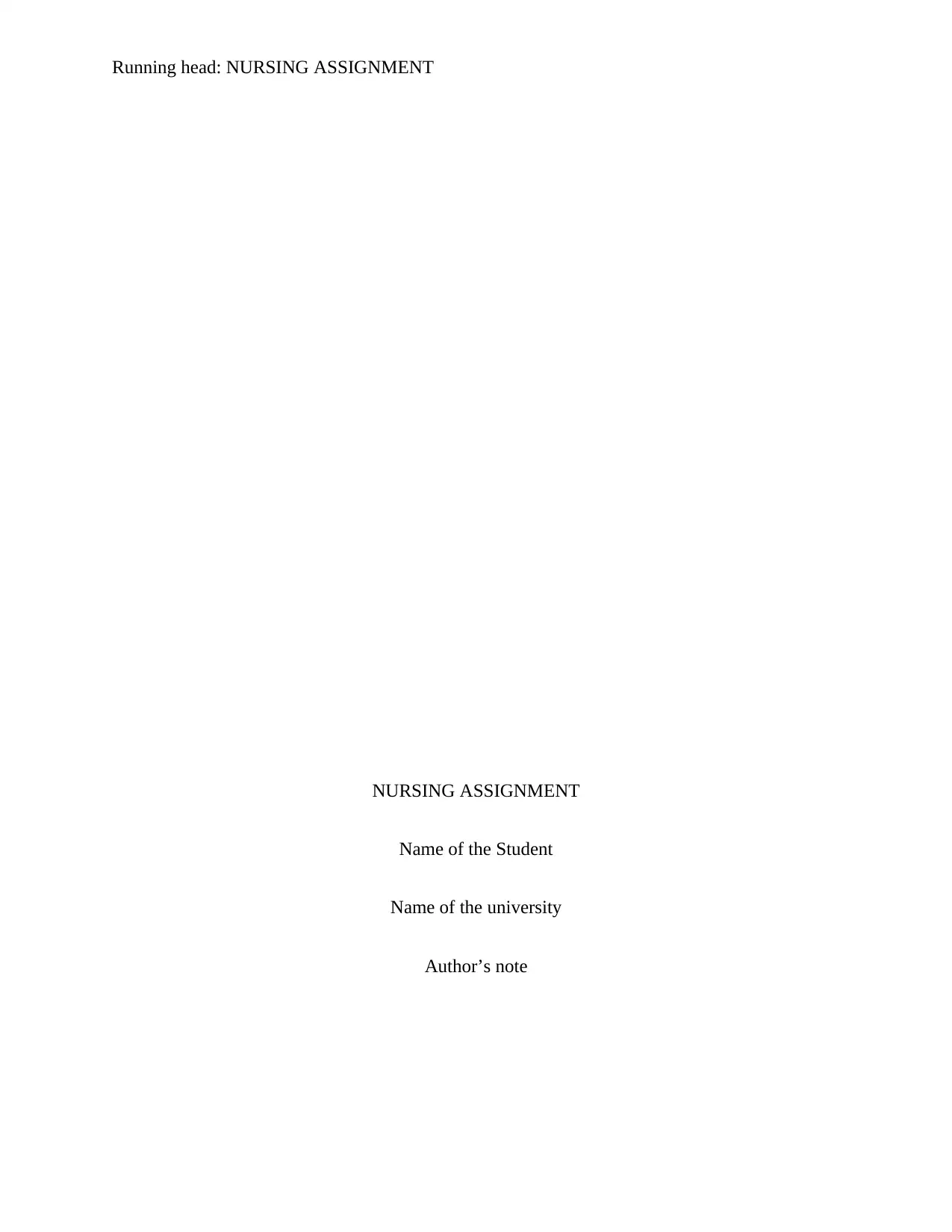
Running head: NURSING ASSIGNMENT
NURSING ASSIGNMENT
Name of the Student
Name of the university
Author’s note
NURSING ASSIGNMENT
Name of the Student
Name of the university
Author’s note
Paraphrase This Document
Need a fresh take? Get an instant paraphrase of this document with our AI Paraphraser
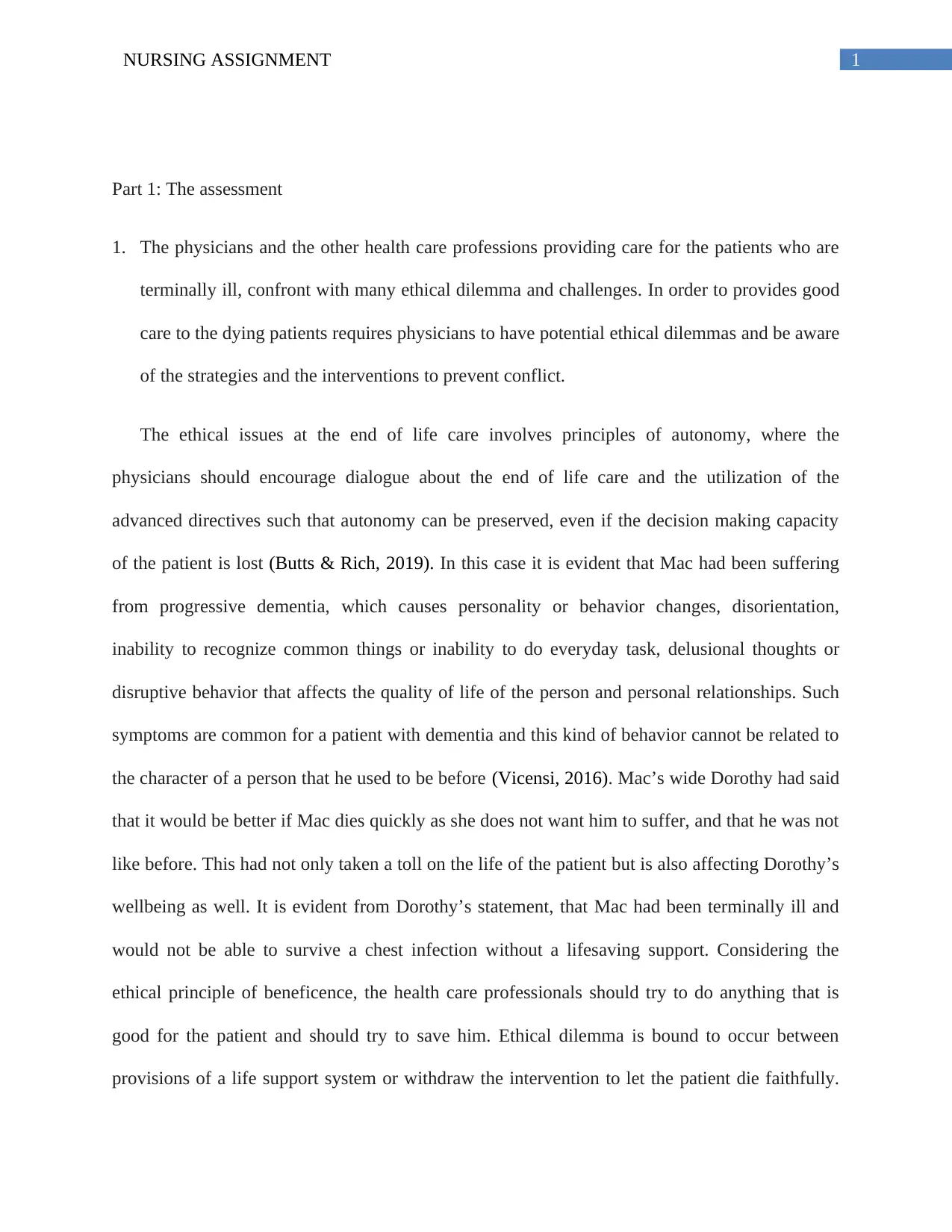
1NURSING ASSIGNMENT
Part 1: The assessment
1. The physicians and the other health care professions providing care for the patients who are
terminally ill, confront with many ethical dilemma and challenges. In order to provides good
care to the dying patients requires physicians to have potential ethical dilemmas and be aware
of the strategies and the interventions to prevent conflict.
The ethical issues at the end of life care involves principles of autonomy, where the
physicians should encourage dialogue about the end of life care and the utilization of the
advanced directives such that autonomy can be preserved, even if the decision making capacity
of the patient is lost (Butts & Rich, 2019). In this case it is evident that Mac had been suffering
from progressive dementia, which causes personality or behavior changes, disorientation,
inability to recognize common things or inability to do everyday task, delusional thoughts or
disruptive behavior that affects the quality of life of the person and personal relationships. Such
symptoms are common for a patient with dementia and this kind of behavior cannot be related to
the character of a person that he used to be before (Vicensi, 2016). Mac’s wide Dorothy had said
that it would be better if Mac dies quickly as she does not want him to suffer, and that he was not
like before. This had not only taken a toll on the life of the patient but is also affecting Dorothy’s
wellbeing as well. It is evident from Dorothy’s statement, that Mac had been terminally ill and
would not be able to survive a chest infection without a lifesaving support. Considering the
ethical principle of beneficence, the health care professionals should try to do anything that is
good for the patient and should try to save him. Ethical dilemma is bound to occur between
provisions of a life support system or withdraw the intervention to let the patient die faithfully.
Part 1: The assessment
1. The physicians and the other health care professions providing care for the patients who are
terminally ill, confront with many ethical dilemma and challenges. In order to provides good
care to the dying patients requires physicians to have potential ethical dilemmas and be aware
of the strategies and the interventions to prevent conflict.
The ethical issues at the end of life care involves principles of autonomy, where the
physicians should encourage dialogue about the end of life care and the utilization of the
advanced directives such that autonomy can be preserved, even if the decision making capacity
of the patient is lost (Butts & Rich, 2019). In this case it is evident that Mac had been suffering
from progressive dementia, which causes personality or behavior changes, disorientation,
inability to recognize common things or inability to do everyday task, delusional thoughts or
disruptive behavior that affects the quality of life of the person and personal relationships. Such
symptoms are common for a patient with dementia and this kind of behavior cannot be related to
the character of a person that he used to be before (Vicensi, 2016). Mac’s wide Dorothy had said
that it would be better if Mac dies quickly as she does not want him to suffer, and that he was not
like before. This had not only taken a toll on the life of the patient but is also affecting Dorothy’s
wellbeing as well. It is evident from Dorothy’s statement, that Mac had been terminally ill and
would not be able to survive a chest infection without a lifesaving support. Considering the
ethical principle of beneficence, the health care professionals should try to do anything that is
good for the patient and should try to save him. Ethical dilemma is bound to occur between
provisions of a life support system or withdraw the intervention to let the patient die faithfully.
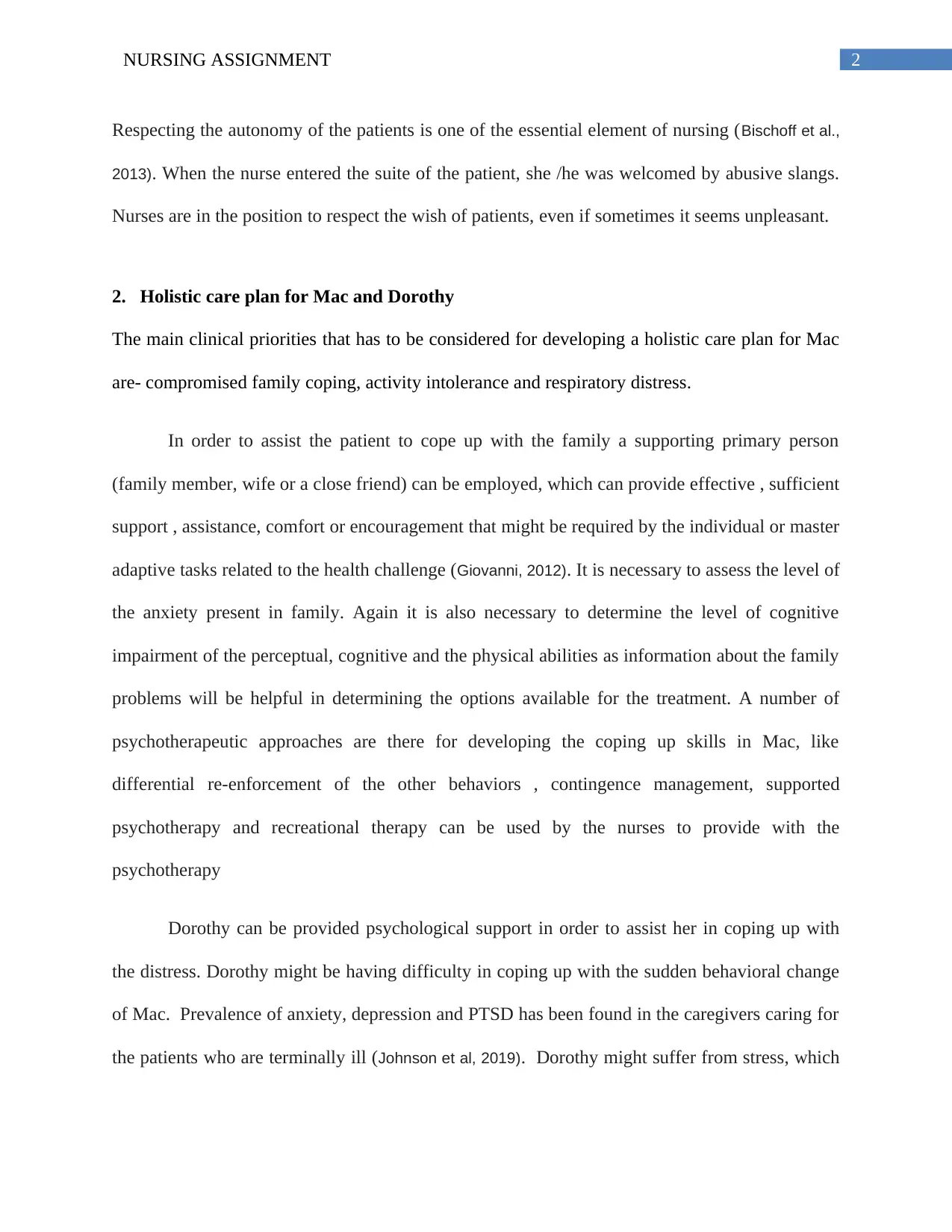
2NURSING ASSIGNMENT
Respecting the autonomy of the patients is one of the essential element of nursing (Bischoff et al.,
2013). When the nurse entered the suite of the patient, she /he was welcomed by abusive slangs.
Nurses are in the position to respect the wish of patients, even if sometimes it seems unpleasant.
2. Holistic care plan for Mac and Dorothy
The main clinical priorities that has to be considered for developing a holistic care plan for Mac
are- compromised family coping, activity intolerance and respiratory distress.
In order to assist the patient to cope up with the family a supporting primary person
(family member, wife or a close friend) can be employed, which can provide effective , sufficient
support , assistance, comfort or encouragement that might be required by the individual or master
adaptive tasks related to the health challenge (Giovanni, 2012). It is necessary to assess the level of
the anxiety present in family. Again it is also necessary to determine the level of cognitive
impairment of the perceptual, cognitive and the physical abilities as information about the family
problems will be helpful in determining the options available for the treatment. A number of
psychotherapeutic approaches are there for developing the coping up skills in Mac, like
differential re-enforcement of the other behaviors , contingence management, supported
psychotherapy and recreational therapy can be used by the nurses to provide with the
psychotherapy
Dorothy can be provided psychological support in order to assist her in coping up with
the distress. Dorothy might be having difficulty in coping up with the sudden behavioral change
of Mac. Prevalence of anxiety, depression and PTSD has been found in the caregivers caring for
the patients who are terminally ill (Johnson et al, 2019). Dorothy might suffer from stress, which
Respecting the autonomy of the patients is one of the essential element of nursing (Bischoff et al.,
2013). When the nurse entered the suite of the patient, she /he was welcomed by abusive slangs.
Nurses are in the position to respect the wish of patients, even if sometimes it seems unpleasant.
2. Holistic care plan for Mac and Dorothy
The main clinical priorities that has to be considered for developing a holistic care plan for Mac
are- compromised family coping, activity intolerance and respiratory distress.
In order to assist the patient to cope up with the family a supporting primary person
(family member, wife or a close friend) can be employed, which can provide effective , sufficient
support , assistance, comfort or encouragement that might be required by the individual or master
adaptive tasks related to the health challenge (Giovanni, 2012). It is necessary to assess the level of
the anxiety present in family. Again it is also necessary to determine the level of cognitive
impairment of the perceptual, cognitive and the physical abilities as information about the family
problems will be helpful in determining the options available for the treatment. A number of
psychotherapeutic approaches are there for developing the coping up skills in Mac, like
differential re-enforcement of the other behaviors , contingence management, supported
psychotherapy and recreational therapy can be used by the nurses to provide with the
psychotherapy
Dorothy can be provided psychological support in order to assist her in coping up with
the distress. Dorothy might be having difficulty in coping up with the sudden behavioral change
of Mac. Prevalence of anxiety, depression and PTSD has been found in the caregivers caring for
the patients who are terminally ill (Johnson et al, 2019). Dorothy might suffer from stress, which
⊘ This is a preview!⊘
Do you want full access?
Subscribe today to unlock all pages.

Trusted by 1+ million students worldwide
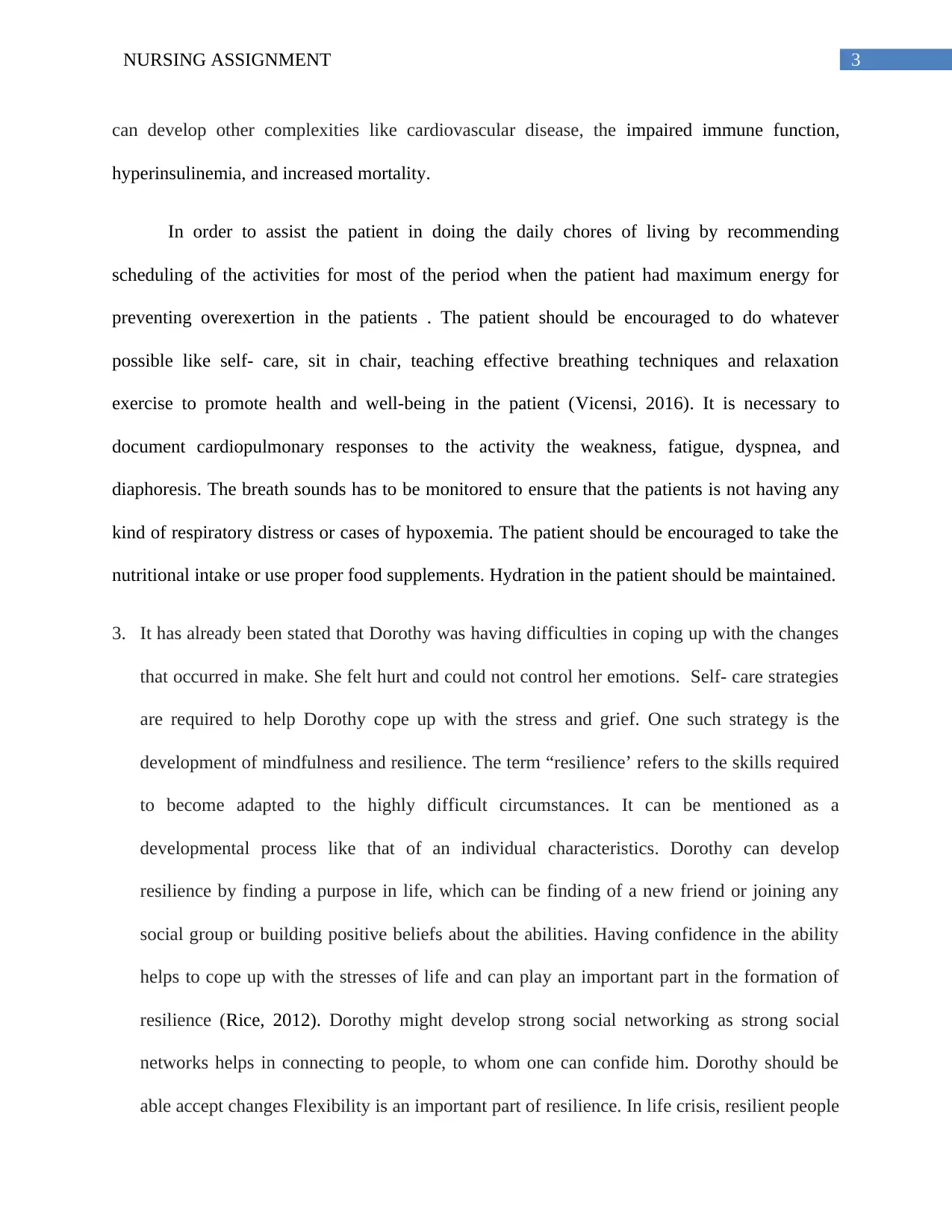
3NURSING ASSIGNMENT
can develop other complexities like cardiovascular disease, the impaired immune function,
hyperinsulinemia, and increased mortality.
In order to assist the patient in doing the daily chores of living by recommending
scheduling of the activities for most of the period when the patient had maximum energy for
preventing overexertion in the patients . The patient should be encouraged to do whatever
possible like self- care, sit in chair, teaching effective breathing techniques and relaxation
exercise to promote health and well-being in the patient (Vicensi, 2016). It is necessary to
document cardiopulmonary responses to the activity the weakness, fatigue, dyspnea, and
diaphoresis. The breath sounds has to be monitored to ensure that the patients is not having any
kind of respiratory distress or cases of hypoxemia. The patient should be encouraged to take the
nutritional intake or use proper food supplements. Hydration in the patient should be maintained.
3. It has already been stated that Dorothy was having difficulties in coping up with the changes
that occurred in make. She felt hurt and could not control her emotions. Self- care strategies
are required to help Dorothy cope up with the stress and grief. One such strategy is the
development of mindfulness and resilience. The term “resilience’ refers to the skills required
to become adapted to the highly difficult circumstances. It can be mentioned as a
developmental process like that of an individual characteristics. Dorothy can develop
resilience by finding a purpose in life, which can be finding of a new friend or joining any
social group or building positive beliefs about the abilities. Having confidence in the ability
helps to cope up with the stresses of life and can play an important part in the formation of
resilience (Rice, 2012). Dorothy might develop strong social networking as strong social
networks helps in connecting to people, to whom one can confide him. Dorothy should be
able accept changes Flexibility is an important part of resilience. In life crisis, resilient people
can develop other complexities like cardiovascular disease, the impaired immune function,
hyperinsulinemia, and increased mortality.
In order to assist the patient in doing the daily chores of living by recommending
scheduling of the activities for most of the period when the patient had maximum energy for
preventing overexertion in the patients . The patient should be encouraged to do whatever
possible like self- care, sit in chair, teaching effective breathing techniques and relaxation
exercise to promote health and well-being in the patient (Vicensi, 2016). It is necessary to
document cardiopulmonary responses to the activity the weakness, fatigue, dyspnea, and
diaphoresis. The breath sounds has to be monitored to ensure that the patients is not having any
kind of respiratory distress or cases of hypoxemia. The patient should be encouraged to take the
nutritional intake or use proper food supplements. Hydration in the patient should be maintained.
3. It has already been stated that Dorothy was having difficulties in coping up with the changes
that occurred in make. She felt hurt and could not control her emotions. Self- care strategies
are required to help Dorothy cope up with the stress and grief. One such strategy is the
development of mindfulness and resilience. The term “resilience’ refers to the skills required
to become adapted to the highly difficult circumstances. It can be mentioned as a
developmental process like that of an individual characteristics. Dorothy can develop
resilience by finding a purpose in life, which can be finding of a new friend or joining any
social group or building positive beliefs about the abilities. Having confidence in the ability
helps to cope up with the stresses of life and can play an important part in the formation of
resilience (Rice, 2012). Dorothy might develop strong social networking as strong social
networks helps in connecting to people, to whom one can confide him. Dorothy should be
able accept changes Flexibility is an important part of resilience. In life crisis, resilient people
Paraphrase This Document
Need a fresh take? Get an instant paraphrase of this document with our AI Paraphraser
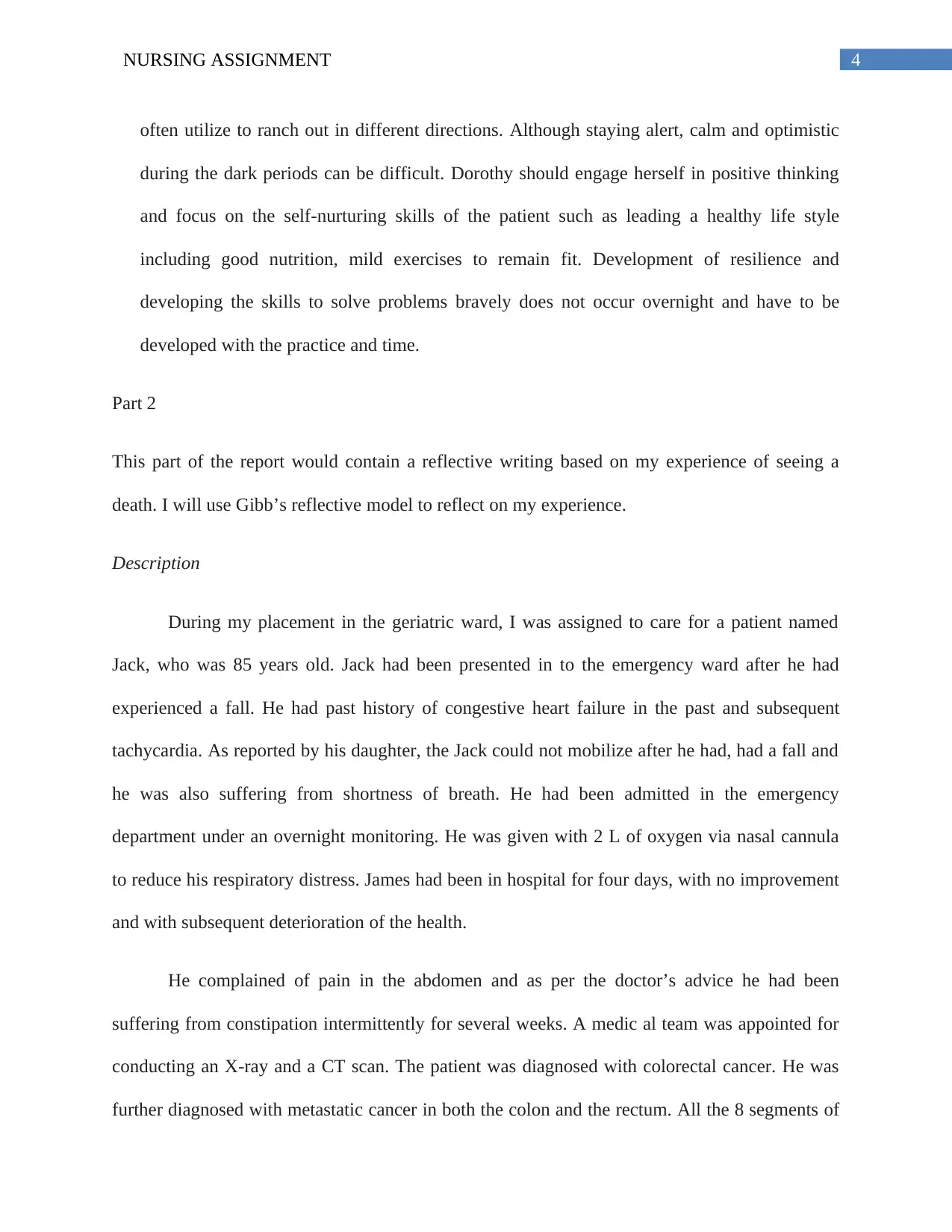
4NURSING ASSIGNMENT
often utilize to ranch out in different directions. Although staying alert, calm and optimistic
during the dark periods can be difficult. Dorothy should engage herself in positive thinking
and focus on the self-nurturing skills of the patient such as leading a healthy life style
including good nutrition, mild exercises to remain fit. Development of resilience and
developing the skills to solve problems bravely does not occur overnight and have to be
developed with the practice and time.
Part 2
This part of the report would contain a reflective writing based on my experience of seeing a
death. I will use Gibb’s reflective model to reflect on my experience.
Description
During my placement in the geriatric ward, I was assigned to care for a patient named
Jack, who was 85 years old. Jack had been presented in to the emergency ward after he had
experienced a fall. He had past history of congestive heart failure in the past and subsequent
tachycardia. As reported by his daughter, the Jack could not mobilize after he had, had a fall and
he was also suffering from shortness of breath. He had been admitted in the emergency
department under an overnight monitoring. He was given with 2 L of oxygen via nasal cannula
to reduce his respiratory distress. James had been in hospital for four days, with no improvement
and with subsequent deterioration of the health.
He complained of pain in the abdomen and as per the doctor’s advice he had been
suffering from constipation intermittently for several weeks. A medic al team was appointed for
conducting an X-ray and a CT scan. The patient was diagnosed with colorectal cancer. He was
further diagnosed with metastatic cancer in both the colon and the rectum. All the 8 segments of
often utilize to ranch out in different directions. Although staying alert, calm and optimistic
during the dark periods can be difficult. Dorothy should engage herself in positive thinking
and focus on the self-nurturing skills of the patient such as leading a healthy life style
including good nutrition, mild exercises to remain fit. Development of resilience and
developing the skills to solve problems bravely does not occur overnight and have to be
developed with the practice and time.
Part 2
This part of the report would contain a reflective writing based on my experience of seeing a
death. I will use Gibb’s reflective model to reflect on my experience.
Description
During my placement in the geriatric ward, I was assigned to care for a patient named
Jack, who was 85 years old. Jack had been presented in to the emergency ward after he had
experienced a fall. He had past history of congestive heart failure in the past and subsequent
tachycardia. As reported by his daughter, the Jack could not mobilize after he had, had a fall and
he was also suffering from shortness of breath. He had been admitted in the emergency
department under an overnight monitoring. He was given with 2 L of oxygen via nasal cannula
to reduce his respiratory distress. James had been in hospital for four days, with no improvement
and with subsequent deterioration of the health.
He complained of pain in the abdomen and as per the doctor’s advice he had been
suffering from constipation intermittently for several weeks. A medic al team was appointed for
conducting an X-ray and a CT scan. The patient was diagnosed with colorectal cancer. He was
further diagnosed with metastatic cancer in both the colon and the rectum. All the 8 segments of
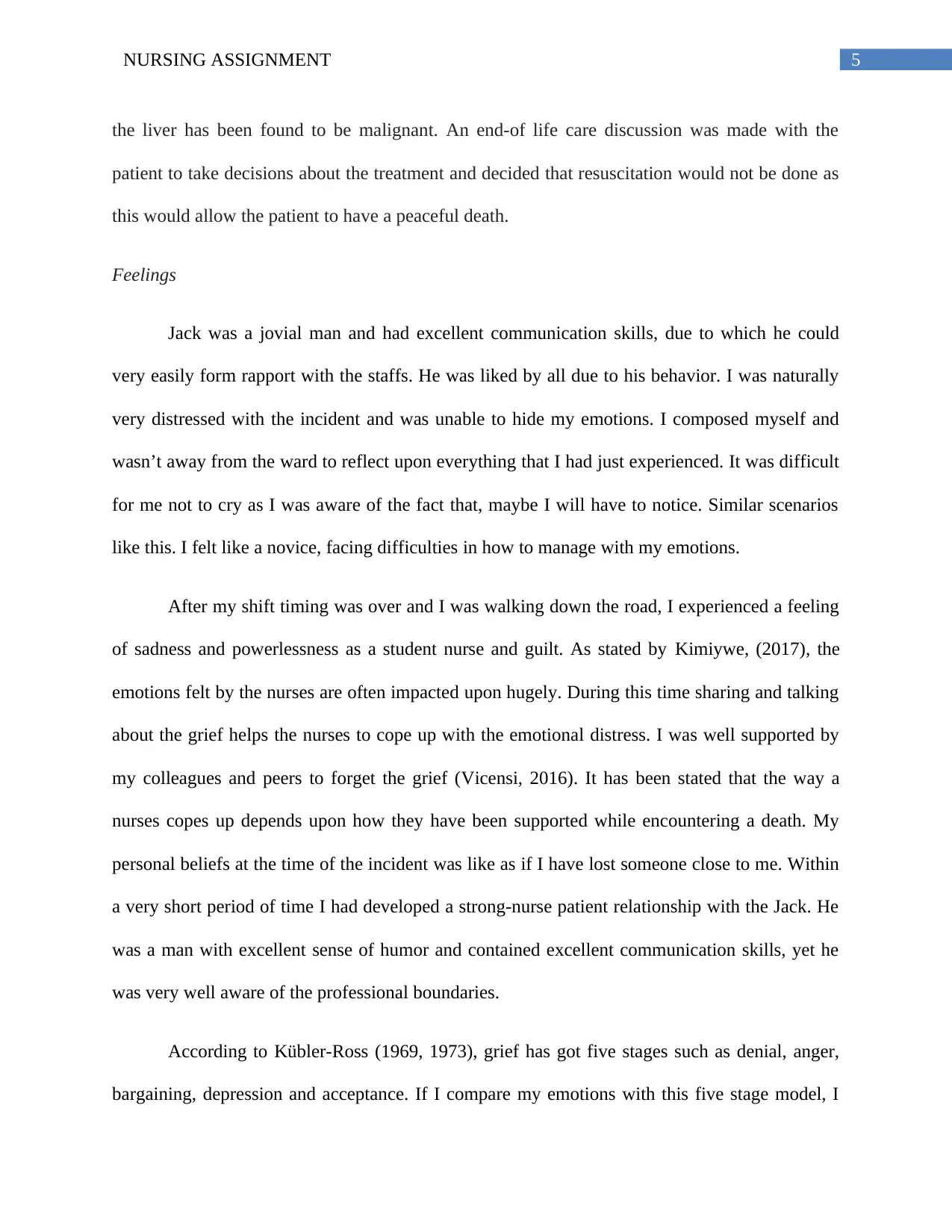
5NURSING ASSIGNMENT
the liver has been found to be malignant. An end-of life care discussion was made with the
patient to take decisions about the treatment and decided that resuscitation would not be done as
this would allow the patient to have a peaceful death.
Feelings
Jack was a jovial man and had excellent communication skills, due to which he could
very easily form rapport with the staffs. He was liked by all due to his behavior. I was naturally
very distressed with the incident and was unable to hide my emotions. I composed myself and
wasn’t away from the ward to reflect upon everything that I had just experienced. It was difficult
for me not to cry as I was aware of the fact that, maybe I will have to notice. Similar scenarios
like this. I felt like a novice, facing difficulties in how to manage with my emotions.
After my shift timing was over and I was walking down the road, I experienced a feeling
of sadness and powerlessness as a student nurse and guilt. As stated by Kimiywe, (2017), the
emotions felt by the nurses are often impacted upon hugely. During this time sharing and talking
about the grief helps the nurses to cope up with the emotional distress. I was well supported by
my colleagues and peers to forget the grief (Vicensi, 2016). It has been stated that the way a
nurses copes up depends upon how they have been supported while encountering a death. My
personal beliefs at the time of the incident was like as if I have lost someone close to me. Within
a very short period of time I had developed a strong-nurse patient relationship with the Jack. He
was a man with excellent sense of humor and contained excellent communication skills, yet he
was very well aware of the professional boundaries.
According to Kübler-Ross (1969, 1973), grief has got five stages such as denial, anger,
bargaining, depression and acceptance. If I compare my emotions with this five stage model, I
the liver has been found to be malignant. An end-of life care discussion was made with the
patient to take decisions about the treatment and decided that resuscitation would not be done as
this would allow the patient to have a peaceful death.
Feelings
Jack was a jovial man and had excellent communication skills, due to which he could
very easily form rapport with the staffs. He was liked by all due to his behavior. I was naturally
very distressed with the incident and was unable to hide my emotions. I composed myself and
wasn’t away from the ward to reflect upon everything that I had just experienced. It was difficult
for me not to cry as I was aware of the fact that, maybe I will have to notice. Similar scenarios
like this. I felt like a novice, facing difficulties in how to manage with my emotions.
After my shift timing was over and I was walking down the road, I experienced a feeling
of sadness and powerlessness as a student nurse and guilt. As stated by Kimiywe, (2017), the
emotions felt by the nurses are often impacted upon hugely. During this time sharing and talking
about the grief helps the nurses to cope up with the emotional distress. I was well supported by
my colleagues and peers to forget the grief (Vicensi, 2016). It has been stated that the way a
nurses copes up depends upon how they have been supported while encountering a death. My
personal beliefs at the time of the incident was like as if I have lost someone close to me. Within
a very short period of time I had developed a strong-nurse patient relationship with the Jack. He
was a man with excellent sense of humor and contained excellent communication skills, yet he
was very well aware of the professional boundaries.
According to Kübler-Ross (1969, 1973), grief has got five stages such as denial, anger,
bargaining, depression and acceptance. If I compare my emotions with this five stage model, I
⊘ This is a preview!⊘
Do you want full access?
Subscribe today to unlock all pages.

Trusted by 1+ million students worldwide
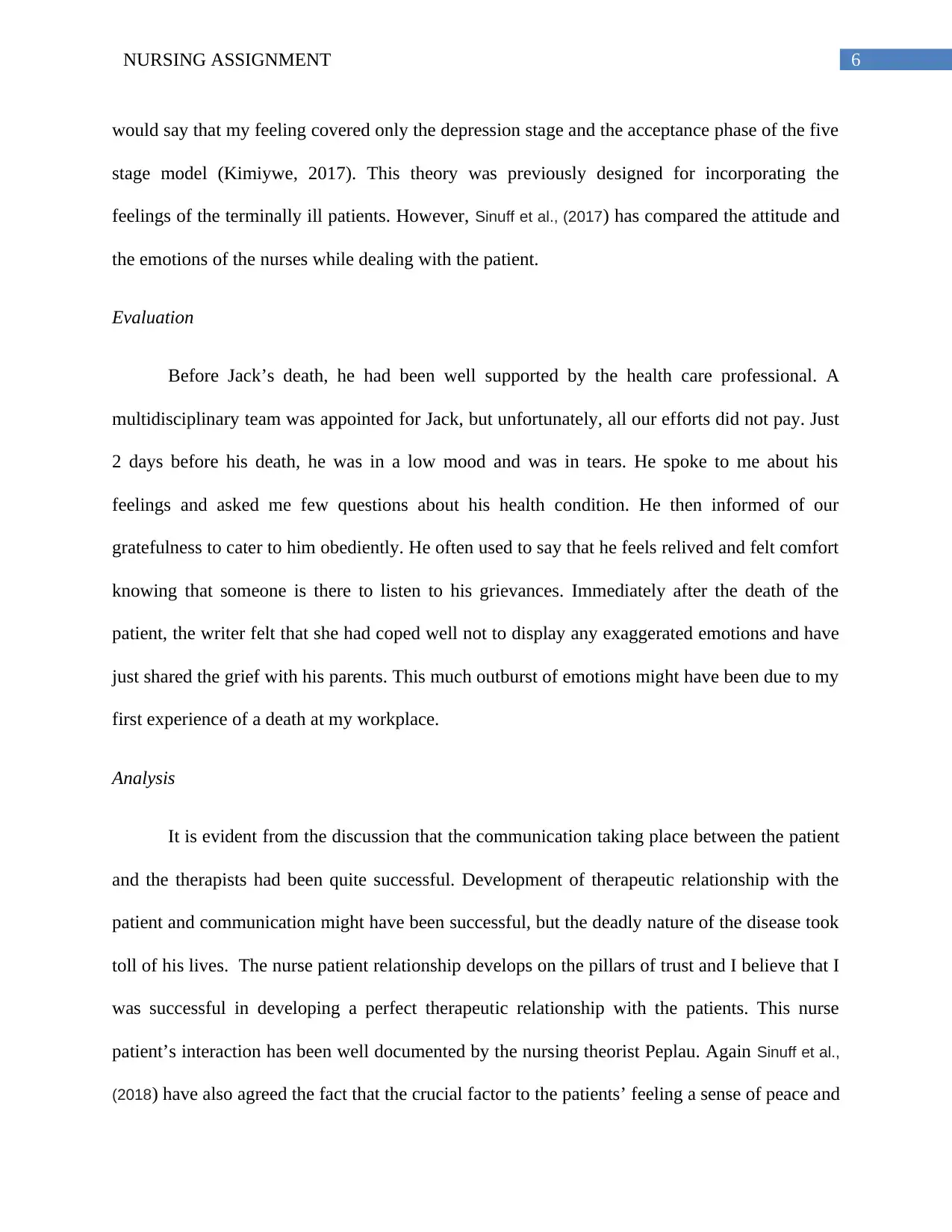
6NURSING ASSIGNMENT
would say that my feeling covered only the depression stage and the acceptance phase of the five
stage model (Kimiywe, 2017). This theory was previously designed for incorporating the
feelings of the terminally ill patients. However, Sinuff et al., (2017) has compared the attitude and
the emotions of the nurses while dealing with the patient.
Evaluation
Before Jack’s death, he had been well supported by the health care professional. A
multidisciplinary team was appointed for Jack, but unfortunately, all our efforts did not pay. Just
2 days before his death, he was in a low mood and was in tears. He spoke to me about his
feelings and asked me few questions about his health condition. He then informed of our
gratefulness to cater to him obediently. He often used to say that he feels relived and felt comfort
knowing that someone is there to listen to his grievances. Immediately after the death of the
patient, the writer felt that she had coped well not to display any exaggerated emotions and have
just shared the grief with his parents. This much outburst of emotions might have been due to my
first experience of a death at my workplace.
Analysis
It is evident from the discussion that the communication taking place between the patient
and the therapists had been quite successful. Development of therapeutic relationship with the
patient and communication might have been successful, but the deadly nature of the disease took
toll of his lives. The nurse patient relationship develops on the pillars of trust and I believe that I
was successful in developing a perfect therapeutic relationship with the patients. This nurse
patient’s interaction has been well documented by the nursing theorist Peplau. Again Sinuff et al.,
(2018) have also agreed the fact that the crucial factor to the patients’ feeling a sense of peace and
would say that my feeling covered only the depression stage and the acceptance phase of the five
stage model (Kimiywe, 2017). This theory was previously designed for incorporating the
feelings of the terminally ill patients. However, Sinuff et al., (2017) has compared the attitude and
the emotions of the nurses while dealing with the patient.
Evaluation
Before Jack’s death, he had been well supported by the health care professional. A
multidisciplinary team was appointed for Jack, but unfortunately, all our efforts did not pay. Just
2 days before his death, he was in a low mood and was in tears. He spoke to me about his
feelings and asked me few questions about his health condition. He then informed of our
gratefulness to cater to him obediently. He often used to say that he feels relived and felt comfort
knowing that someone is there to listen to his grievances. Immediately after the death of the
patient, the writer felt that she had coped well not to display any exaggerated emotions and have
just shared the grief with his parents. This much outburst of emotions might have been due to my
first experience of a death at my workplace.
Analysis
It is evident from the discussion that the communication taking place between the patient
and the therapists had been quite successful. Development of therapeutic relationship with the
patient and communication might have been successful, but the deadly nature of the disease took
toll of his lives. The nurse patient relationship develops on the pillars of trust and I believe that I
was successful in developing a perfect therapeutic relationship with the patients. This nurse
patient’s interaction has been well documented by the nursing theorist Peplau. Again Sinuff et al.,
(2018) have also agreed the fact that the crucial factor to the patients’ feeling a sense of peace and
Paraphrase This Document
Need a fresh take? Get an instant paraphrase of this document with our AI Paraphraser
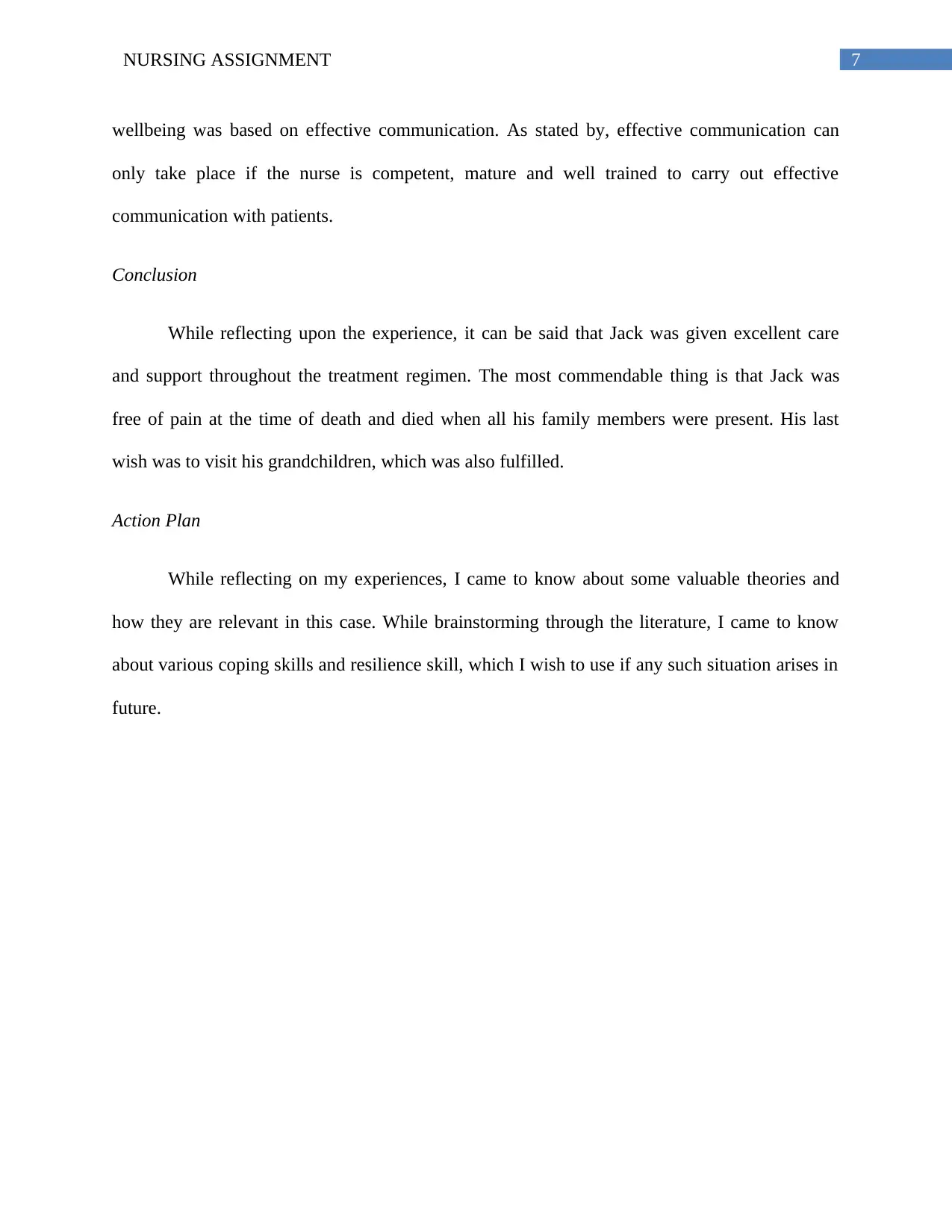
7NURSING ASSIGNMENT
wellbeing was based on effective communication. As stated by, effective communication can
only take place if the nurse is competent, mature and well trained to carry out effective
communication with patients.
Conclusion
While reflecting upon the experience, it can be said that Jack was given excellent care
and support throughout the treatment regimen. The most commendable thing is that Jack was
free of pain at the time of death and died when all his family members were present. His last
wish was to visit his grandchildren, which was also fulfilled.
Action Plan
While reflecting on my experiences, I came to know about some valuable theories and
how they are relevant in this case. While brainstorming through the literature, I came to know
about various coping skills and resilience skill, which I wish to use if any such situation arises in
future.
wellbeing was based on effective communication. As stated by, effective communication can
only take place if the nurse is competent, mature and well trained to carry out effective
communication with patients.
Conclusion
While reflecting upon the experience, it can be said that Jack was given excellent care
and support throughout the treatment regimen. The most commendable thing is that Jack was
free of pain at the time of death and died when all his family members were present. His last
wish was to visit his grandchildren, which was also fulfilled.
Action Plan
While reflecting on my experiences, I came to know about some valuable theories and
how they are relevant in this case. While brainstorming through the literature, I came to know
about various coping skills and resilience skill, which I wish to use if any such situation arises in
future.
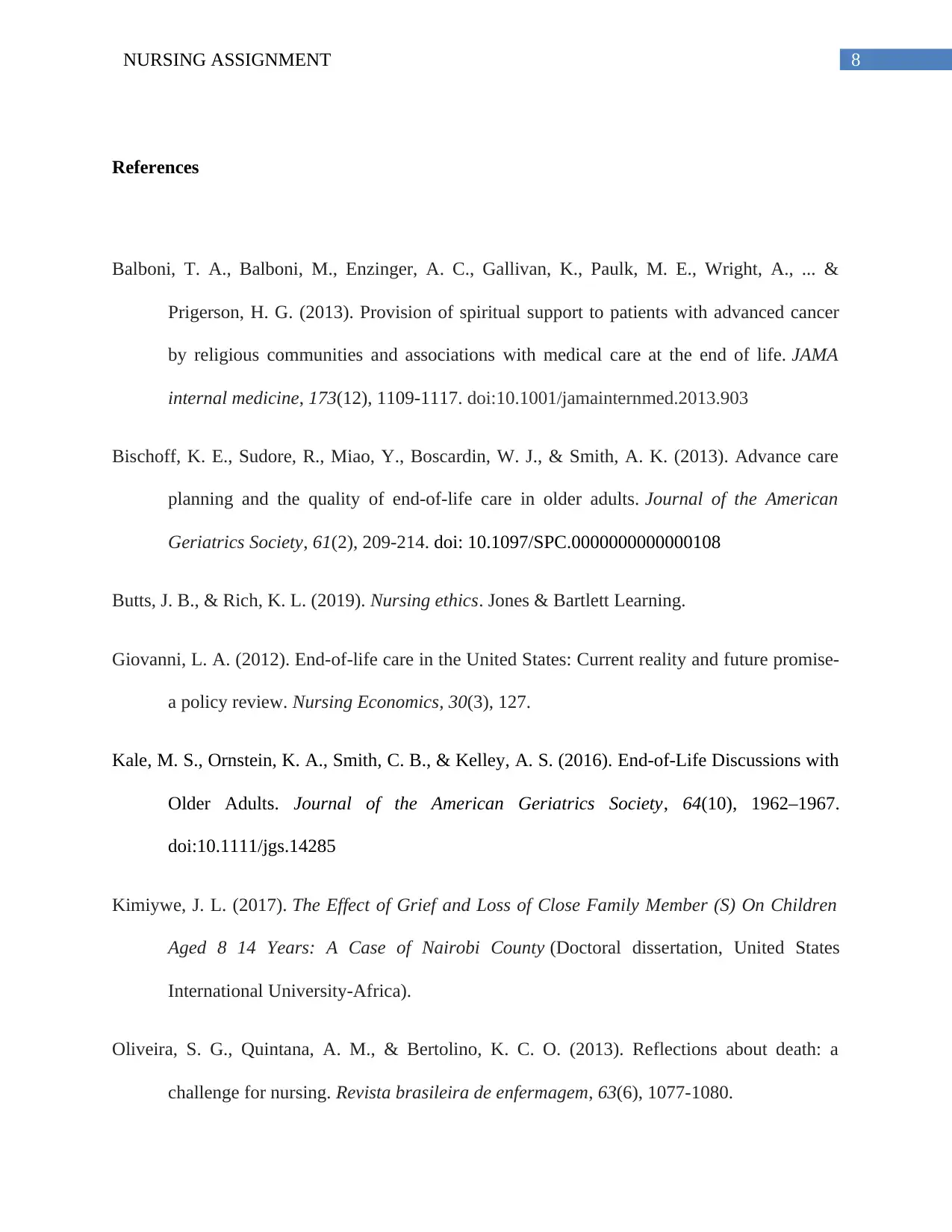
8NURSING ASSIGNMENT
References
Balboni, T. A., Balboni, M., Enzinger, A. C., Gallivan, K., Paulk, M. E., Wright, A., ... &
Prigerson, H. G. (2013). Provision of spiritual support to patients with advanced cancer
by religious communities and associations with medical care at the end of life. JAMA
internal medicine, 173(12), 1109-1117. doi:10.1001/jamainternmed.2013.903
Bischoff, K. E., Sudore, R., Miao, Y., Boscardin, W. J., & Smith, A. K. (2013). Advance care
planning and the quality of end‐of‐life care in older adults. Journal of the American
Geriatrics Society, 61(2), 209-214. doi: 10.1097/SPC.0000000000000108
Butts, J. B., & Rich, K. L. (2019). Nursing ethics. Jones & Bartlett Learning.
Giovanni, L. A. (2012). End-of-life care in the United States: Current reality and future promise-
a policy review. Nursing Economics, 30(3), 127.
Kale, M. S., Ornstein, K. A., Smith, C. B., & Kelley, A. S. (2016). End-of-Life Discussions with
Older Adults. Journal of the American Geriatrics Society, 64(10), 1962–1967.
doi:10.1111/jgs.14285
Kimiywe, J. L. (2017). The Effect of Grief and Loss of Close Family Member (S) On Children
Aged 8 14 Years: A Case of Nairobi County (Doctoral dissertation, United States
International University-Africa).
Oliveira, S. G., Quintana, A. M., & Bertolino, K. C. O. (2013). Reflections about death: a
challenge for nursing. Revista brasileira de enfermagem, 63(6), 1077-1080.
References
Balboni, T. A., Balboni, M., Enzinger, A. C., Gallivan, K., Paulk, M. E., Wright, A., ... &
Prigerson, H. G. (2013). Provision of spiritual support to patients with advanced cancer
by religious communities and associations with medical care at the end of life. JAMA
internal medicine, 173(12), 1109-1117. doi:10.1001/jamainternmed.2013.903
Bischoff, K. E., Sudore, R., Miao, Y., Boscardin, W. J., & Smith, A. K. (2013). Advance care
planning and the quality of end‐of‐life care in older adults. Journal of the American
Geriatrics Society, 61(2), 209-214. doi: 10.1097/SPC.0000000000000108
Butts, J. B., & Rich, K. L. (2019). Nursing ethics. Jones & Bartlett Learning.
Giovanni, L. A. (2012). End-of-life care in the United States: Current reality and future promise-
a policy review. Nursing Economics, 30(3), 127.
Kale, M. S., Ornstein, K. A., Smith, C. B., & Kelley, A. S. (2016). End-of-Life Discussions with
Older Adults. Journal of the American Geriatrics Society, 64(10), 1962–1967.
doi:10.1111/jgs.14285
Kimiywe, J. L. (2017). The Effect of Grief and Loss of Close Family Member (S) On Children
Aged 8 14 Years: A Case of Nairobi County (Doctoral dissertation, United States
International University-Africa).
Oliveira, S. G., Quintana, A. M., & Bertolino, K. C. O. (2013). Reflections about death: a
challenge for nursing. Revista brasileira de enfermagem, 63(6), 1077-1080.
⊘ This is a preview!⊘
Do you want full access?
Subscribe today to unlock all pages.

Trusted by 1+ million students worldwide
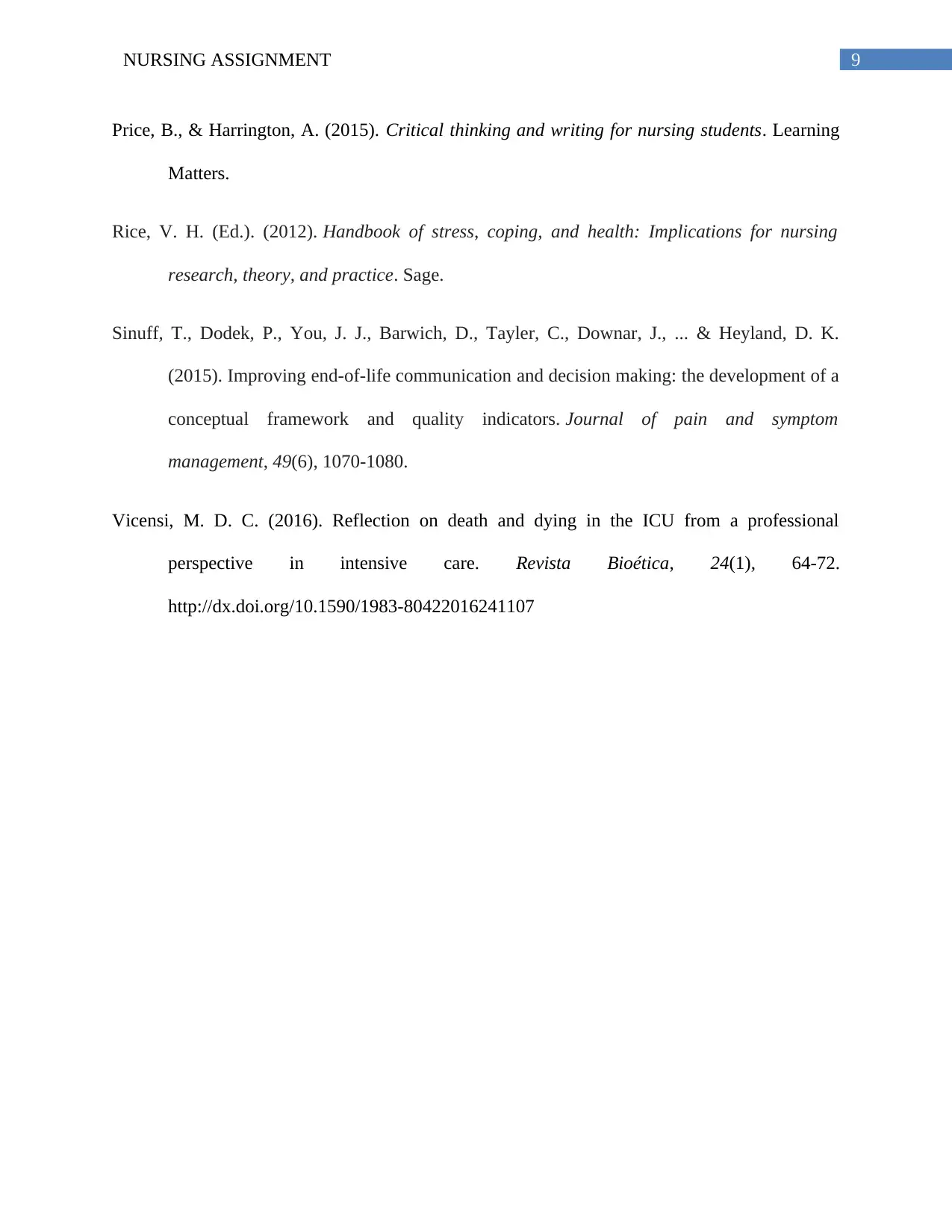
9NURSING ASSIGNMENT
Price, B., & Harrington, A. (2015). Critical thinking and writing for nursing students. Learning
Matters.
Rice, V. H. (Ed.). (2012). Handbook of stress, coping, and health: Implications for nursing
research, theory, and practice. Sage.
Sinuff, T., Dodek, P., You, J. J., Barwich, D., Tayler, C., Downar, J., ... & Heyland, D. K.
(2015). Improving end-of-life communication and decision making: the development of a
conceptual framework and quality indicators. Journal of pain and symptom
management, 49(6), 1070-1080.
Vicensi, M. D. C. (2016). Reflection on death and dying in the ICU from a professional
perspective in intensive care. Revista Bioética, 24(1), 64-72.
http://dx.doi.org/10.1590/1983-80422016241107
Price, B., & Harrington, A. (2015). Critical thinking and writing for nursing students. Learning
Matters.
Rice, V. H. (Ed.). (2012). Handbook of stress, coping, and health: Implications for nursing
research, theory, and practice. Sage.
Sinuff, T., Dodek, P., You, J. J., Barwich, D., Tayler, C., Downar, J., ... & Heyland, D. K.
(2015). Improving end-of-life communication and decision making: the development of a
conceptual framework and quality indicators. Journal of pain and symptom
management, 49(6), 1070-1080.
Vicensi, M. D. C. (2016). Reflection on death and dying in the ICU from a professional
perspective in intensive care. Revista Bioética, 24(1), 64-72.
http://dx.doi.org/10.1590/1983-80422016241107
1 out of 10
Related Documents
Your All-in-One AI-Powered Toolkit for Academic Success.
+13062052269
info@desklib.com
Available 24*7 on WhatsApp / Email
![[object Object]](/_next/static/media/star-bottom.7253800d.svg)
Unlock your academic potential
Copyright © 2020–2026 A2Z Services. All Rights Reserved. Developed and managed by ZUCOL.





